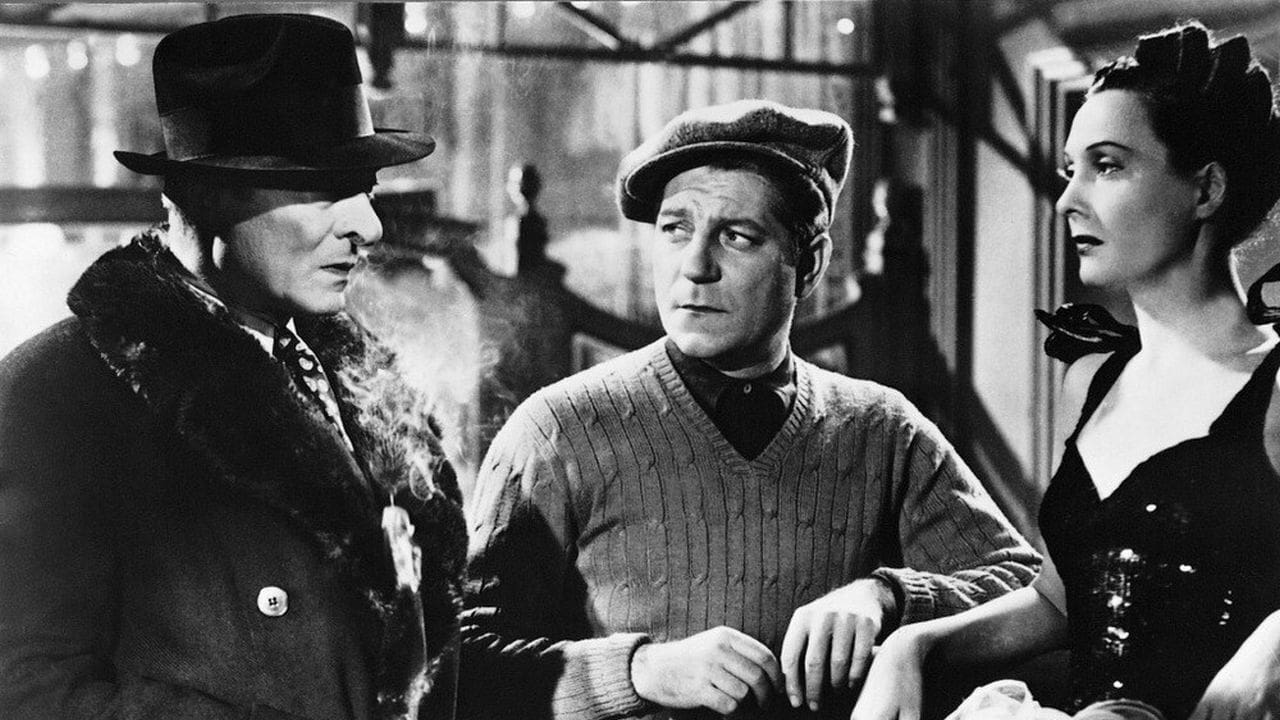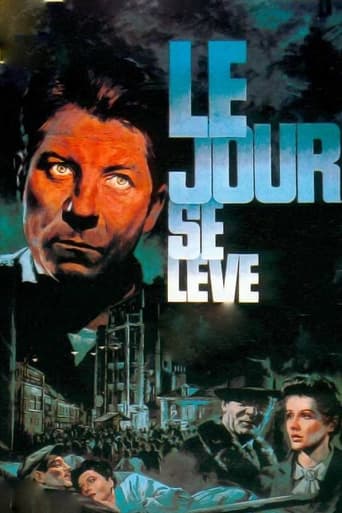Ameriatch
One of the best films i have seen
Mjeteconer
Just perfect...
Jemima
It's a movie as timely as it is provocative and amazingly, for much of its running time, it is weirdly funny.
Aspen Orson
There is definitely an excellent idea hidden in the background of the film. Unfortunately, it's difficult to find it.
Kirpianuscus
The atmosphere, the construction of story, the mist of emotions, the silence moments. as basic virtues / pillars of a film reminding the art of a director, the genius of actors, the old fashion drama rules, the force of detail and the science to transform the viewer in part of story. nothing new. a man, after the worst gesture and his memories. a night. and a decision. and the roots of ppresent. it is easy to say many things about a film who, at the first sigh, seems correct. and only its ash poetry , not unknown, makes the difference by other films with similar theme. a film about a man. his world. and his too powerful love.
Scott44
***Interesting commentary from Varlaam ("A tragedy of everyday proportions", Varlaam from Toronto, Canada, 3 February 1999), who uses actor math to describe Jean Gabin. Also, writers_reign from London ("Twilight At Dawn", writers_reign from London, England, 8 December 2003) adds context for the principal participants. Finally, nowlang ("A French Masterpiece about the Tragedy of a Simple Man's Life", nowlang (lancelot1953@msn.com) from Small Town, New England, USA, 12 September 2006) adds interesting insight.***"Le jour se lève (Daybreak; 1939, Marcel Carné, France) is another superlative film from Carné. A common laborer is known to have killed a man, and is holed-up awaiting his fate. With the arrival of the Second World War looming, the participants involved in this project still manage to leave behind a story filled with understanding about the human condition.The film is very brave, as it is not hard to argue that "Daybreak" is a veiled protest against the increasingly repressive government. (The Vichy regime, which collaborated with the Nazis, took over a year after this film's release.) In the film's opening, a title card informs us that a murder has been committed and we will see what caused the murderer to act. The message has little purpose but to create the idea of a government proclamation announcing that someone is an enemy of the state. Who threatens the state the most? The French police exacerbate tensions whenever possible. They have François (Jean Gabin) trapped in his third-story apartment. Without a word of dialog, they begin shooting at François. Later, they deny a potentially crisis- ending conversation between François and several of his coworkers. When the laborers in the street begin to show signs of support for François, the police crush the public expression with violence against the helpless crowd. By starting with the title card that clarifies the government's official position and then presenting a story that encourages sympathy for the public enemy, "Daybreak" makes the statement that the present French government is getting out of control.Some viewers have an issue with the central cheat in the story, namely that François completely fails to recognize he has a legitimate case to make to an impartial jury. This is explained in part by the Fascistic police, which offer no sign they intend for him to receive a fair trial. There also seems to be relevance in the deceased having been an animal trainer. His ex-girlfriend and show partner Clara (Arletty) will describe some of Valentine's cruelty to his dogs by mentioning a specific example. So, perhaps François does not take steps to improve his situation because he is identified with the unfortunate puppies who can never escape Valentine's sadism. When weary François hysterically communicates with the crowd below, he might be offering some of the despair of show animals being cruelly trained. (An example of how Valentine torments François is by repeatedly calling him "simple." BTW, "Daybreak" sure has a lot more awareness about the plight of animals than does the "Wizard of Oz," also made in 1939.)It is a trademark of the collaboration between Carné (direction) and Jacques Prévert's (dialog) that a sense of balance is felt with the entire cast. Even the characters with brief moments on screen are perfectly realized. Jean Gabin is excellent in the lead role. He's one of my all-time favorite actors. If you mixed Spencer Tracy's looks with Humphrey Bogart's grit, sprinkling in Robert Mitchum's indifference, while supplying the result with a vast quantity of cigarettes, you might produce an actor similar. Gabin excels at portraying primitives, and is as convincing as a criminal as he is endearing. Gabin is a perfect choice for this despairing role of a laborer who grew up in an orphanage and now endures soul-crushing work to get by."Daybreak" is useful in understanding how Arletty was a successful leading lady despite being in her 40s. As an actress, she brings mystery and cleverness to her roles. While Arletty/Clara is an attractive woman, it is obvious that the younger, sensual Françoise, is intended to be the head-turner. Still, Arletty's Clara is a lot more streetwise than Françoise. Clara does not fall to pieces when situations get tough. Arletty appears to have been successful as a romantic lead during this turbulent era because she seems to offer the French male a partner that can hold up under duress.The sexuality is very advanced for 1939. There are four main characters and each has partnered with two others of the group. The scene where François joins Françoise on her bed is risqué. Françoise is also "ruined" when it is revealed her relationship with Valentine is not platonic. One can imagine the government censors having many internal conversations about just the sexual behavior on display. (I was a little annoyed in the naming similarity between François and Françoise. However, maybe this is to emphasize the similar states of mind the pair have at the finish.)If you are a cinema buff you won't want to miss this.
dreverativy
I cannot say that this is my favourite Jean Gabin film (which is either "La Bete Humaine" - which he made immediately before this one - or "Pepe le Moko"). However it is still exceedingly good, and is one of the best efforts of that most distinguished director, Marcel Carne. It has a good claim to be one of the best films of the 'golden age' of French cinema.It is, above all, a film of atmospherics. The tall, stark tenement building, with a huge, rude, blank wall fit only for advertisements in some dismal north-eastern coal town - at the remote top of which lives this remarkable bundle of repressed violence and sexual energy, Francois (Gabin). We are transported, through the brilliant, claustrophobic sets of Alexandre Trauner, the emotive music of Maurice Jaubert, the smoky photography of Curt Courant (and co.) and, above all, through the haunting, eccentric, almost verbose script of Jacques Prevert, into a state of almost intolerable tension. Francois is almost the ideal of a type - the sturdy, manly cannon fodder of the Marne and Verdun, who would surely have backed Leon Blum and marched behind Maurice Thorez and Jacques Duclos. He is tempted by the pure love of Francoise (the luminescent Jacqueline Laurent) and the slightly debased love of Clara (the lovely Arletty). Set against him is his antithesis, the somewhat demonic M. Valentin, a cut-rate showman, cruel to the dogs from whom he profits (Jules Berry, excellent). So we have a love triangle (or is it a square?) about a story that passes in a circle (the ending being the beginning).And, with his back against the wall, Francois lies in his bare, empty little room, smoking his last Gitanes, ruminating on his shattered dreams, and contemplating his forthcoming extinction. A bit like France in 1939, perhaps.
MartinHafer
This is an excellent French film that deserves to be discovered by modern audiences. Although many "Film Noir" fans might consider the gangster films of Warner Brothers from the 1930s to be true examples of the genre, I look at them more as "Noir-Lite"--as they are more formulaic and more upbeat than the Noir films of the 40s and 50s. So although the thug that Cagney or Raft or Bogart plays in the film is tough and often uses the lingo of true Noir, you KNOW that by the end of the film the bad guy MUST lose and this is all an object lesson to us all about good and evil. But, with later Noir (as well as this film), it rose to a new level because things were often not so "cut and dry"--sometimes evil DID win or the line between good and evil was blurred. It's because of this that for a 1939 film that Le Jour Se Lève excels as a film--unlike the traditional Warner "baddies", the lead, Jean Gabin is neither good nor bad--and his story of how a normal guy can feel forced to kill that makes this film stand out from the crowd.The film begins with a murder and within moments you know that Gabin shot the victim--there is no mystery about this at all. You see how Gabin meets a nice girl and falls for her but this also ultimately leads to the murder. In many ways, this is reminiscent of the great Noir classic DOA, as the film begins you KNOW that Edmund O'Brien will die but the story leading up to it is what the focus will be.I could talk about this story further, but I don't want to spoil the suspense. Instead, let's briefly talk about the technical merit of the film. Jean Gabin was an amazing actor and while I didn't always like all of his films, I definitely admire his casual acting style. In many ways, he looks and acts like a slightly more rugged version of Spencer Tracy. This "everyman" quality make him a good choice for Noir--he's not just some "pretty boy". The supporting cast is very good as well. But the real stars, apart from Gabin, are the writers, director and cinematographer. The story works as does the dialog, the pacing and composition is great and the camera angles and lighting are superb. A fine film with little to complain about--and for me THAT'S unusual!

